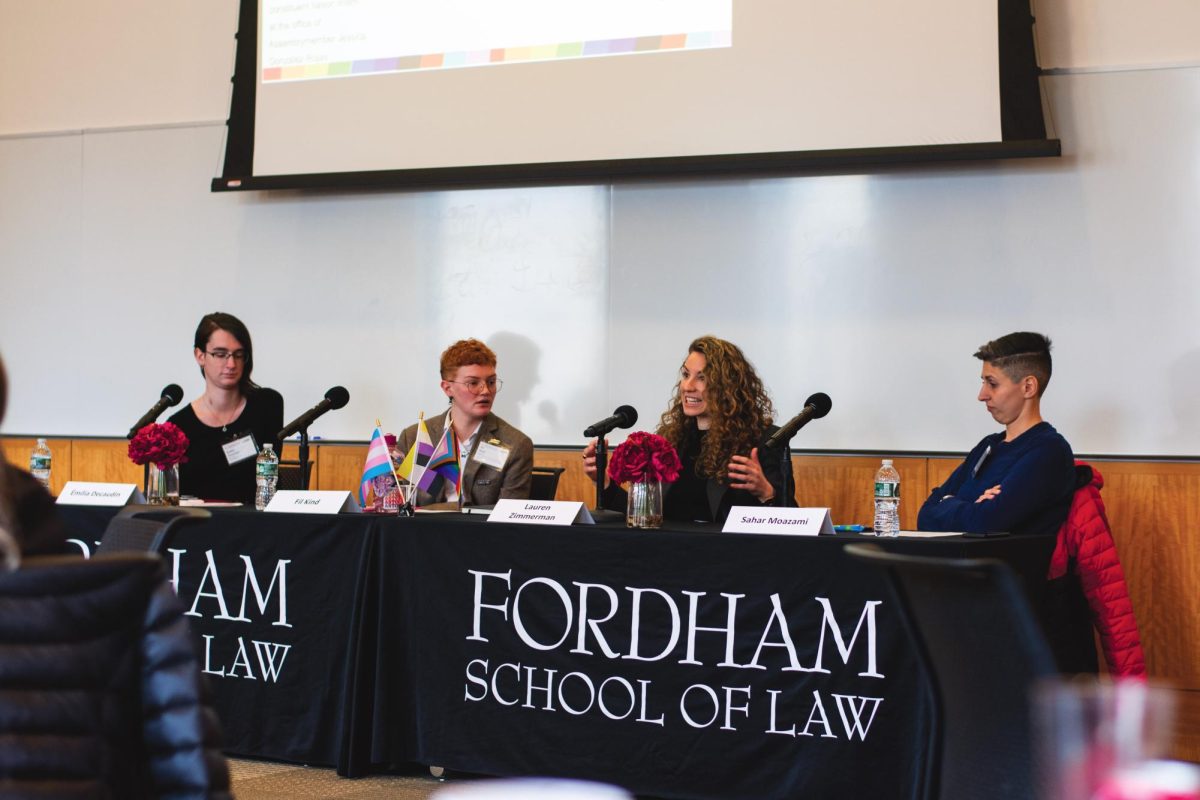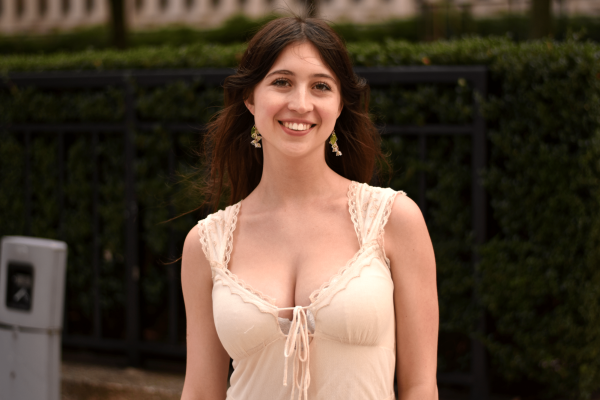Fordham OUTLaws hosted its annual symposium in Fordham Law School (LAW) on March 4, educating students on the effects of federal, state and local elections on LGBTQ+ rights and how to get involved.
The event was part of Fordham’s 2025 Week of Abolition, in which various LAW student organizations presented events focused on justice and advocacy.
OUTLaws is LAW’s LGBTQ+ affinity and advocacy group. Around 35 people attended in person and another 90 joined over Zoom. The event was split into three panels and ran from 12 p.m. to 5 p.m., followed by a reception at Valhalla, a bar near Fordham’s Lincoln Center campus.
LAW Dean Joseph Landau gave a brief speech to kick off the event, lauding the value of a law education as a tool for justice in today’s fraught political climate.
“If you think for a moment you’re not doing enough, or that you’re not doing the right thing, I want you to think again. You’re doing everything right by preparing for a career in which you advocate, counsel, speak up and fight,” Landau said.
There was a shared sentiment amongst panelists to encourage community organization, engagement and voter turnout.
Dominic Cigna, organizing co-chair of the event, introduced the first panel on the future of LGBTQ+ rights under a “Trump-led” Supreme Court. They emphasized the importance of political action to protect trans youth, even in a progressive city like New York City.
“In many ways, we’re fortunate to live in the city that we do. We’ve also seen proof that passive existence is not enough. We must actively engage in elections at every level to protect all of us,” Cigna said.
The first three panelists counseled law students on how best to leverage their educations to protect queer, trans and otherwise marginalized New Yorkers.
Alexia Korberg, executive director of Her Justice, a nonprofit offering free legal help to New York City women living in poverty, argued that the current Supreme Court was the wrong venue for lawsuits intended to affect social change or “impact litigation.” They specified this should apply to affirmative litigation cases, not if the plaintiff is the defendant.
“If you think for a moment you’re not doing enough, or that you’re not doing the right thing, I want you to think again. You’re doing everything right by preparing for a career in which you advocate, counsel, speak up and fight.” Fordham Law School Dean Joseph Landau
Korberg worked as a constitutional litigation attorney for 13 years before they came to Her Justice. Korberg said they were demoralized by what they considered an erosion of the rule of law in the Supreme Court.
“I think it’s a farce that we’re doing rule of law on constitutional issues,” Korberg said.
Lauren Zimmerman, a partner at the Selendy Gay PLLC law firm, has litigated book bans at public schools and libraries for the last two years. She shared a similar perspective on the future of anti-LGBTQ+ rulings during the third panel, saying judges are failing to follow any legal standard on book bans.
“I think that the gloves are off in terms of the reasoning for why books can be removed,” Zimmerman said.
James Salwen, a bankruptcy lawyer “by day” and pro bono litigator on the side, agreed with Korberg’s stance. Salwen said “choosing your battles” is key in cases where “the bad result is the status quo.”
“You don’t want to be making bold charges where a loss makes things worse,” Salwen said.
Salwen also shared practical advice for law students wishing to get involved on the ground level. He said it is important to choose the correct plaintiffs, legal theory and district court, particularly when litigating in right-leaning states.
“I think there are judges there who, most likely, really consider themselves on a mission to accomplish certain non-judicial ends. But I think we have judges who are trying on some level to do the right thing and have what I would consider the wrong premises in their minds to begin with,” Salwen said.
Salwen worked pro bono on United States v. Skrmetti, a pending Supreme Court case on whether bans on gender-affirming care for minors in Tennessee violate the Equal Protection Clause.
Beyond this clause, other potential protections against executive orders, including the New York state Human Rights Law and Civil Rights Law, were discussed in the second panel, “State of Equality: Safeguarding LGBTQ+ Rights in NY.”
“I think that the gloves are off in terms of the reasoning for why books can be removed.” Lauren Zimmerman, partner at Selendy Gay PLLC law firm
Gabriella Laros, an attorney at the New York City Civil Liberties Union, used both these provisions in two suits against Nassau County. The suits countered a new regulation requiring any team using county facilities to designate itself as male, female or co-ed — defining gender based on sex assigned at birth — in order to bar trans people from competing in sports.
“The judge in our case issued a decision concluding without much reasoning that this local law doesn’t discriminate on the basis of gender identity and that it doesn’t violate the human rights law or the civil rights law in New York,” Laros said.
Another potential provision is the November 2024 Equal Rights Amendment (ERA), which protects against discrimination based on “race, color, ethnicity, national origin, age, disability, creed [or], religion, or sex, including sexual orientation, gender identity, gender expression, pregnancy, pregnancy outcomes, and reproductive healthcare and autonomy.”
The original suits did not consider the ERA because it had not yet been instituted. An appeal has been filed.
“We in New York, in New York City and New York state, have some of the most expansive and inclusive laws and protections.” Sahar Moazami, assistant deputy director of the New York City Council
This expansive definition of discrimination aims to protect affirmative action, reproductive rights and more, but may result in conflicts between groups claiming protections, according to Julie Suk, professor of law.
“I think it is worth taking seriously because I think that the concept of discrimination doesn’t get us that far,” Suk said. “Once you have that in there, now you say no disparate impact based on religion, that’s actually giving traditional and conservative religious communities an opportunity to say, ‘oh, if you make us comply with anti-discrimination laws protecting LGBTQ+ people, that is a disparate impact on religious communities.’”
Sahar Moazami, assistant deputy director of the New York City Council, offered a more heartening perspective in the third panel: “Understanding the Impact of Local Politics on Our City’s Queer and Trans Community.”
“We in New York, in New York City and New York state, have some of the most expansive and inclusive laws and protections, including the most recently passed ERA provisions in our state constitution, but also our New York City human rights law,” Moazami said.
They also said New York City’s $110 billion budget insulates New Yorkers from federal funding cuts.
All panelists agreed on the importance of voting for local elections, with New York City ranking second-to-last in voter turnout for big cities.
Filament Kind, an intern at assemblymember Jessica González-Rojas’s office, countered this assertion, pointing out that well-intentioned laws may not best serve their constituents, such as in the case of the Supplemental Nutrition Assistance Program (SNAP).
“To qualify for SNAP, a family of one must make under $19,584 a year, which is less than $1,632 monthly. I dunno what you guys pay in rent. That’s insane,” Kind said.
All panelists agreed on the importance of voting for local elections, with New York City ranking second-to-last in voter turnout for big cities. But, there is more to do besides voting. Kind pointed to the value of mutual aid to support queer and trans people, who face higher poverty rates.
“Voting is just the start. There’s so much more that we can do more broadly … I also think importantly, to bring it back to mutual aid, engaging in your community and assisting your community is also incredibly valuable,” Kind said.
There was a shared sentiment amongst panelists to encourage community organization, engagement and voter turnout.
“Encourage you to get your friends to pay attention to local politics, board elections, understand what jurisdiction, what districts near you are doing what, and focus on candidates that’ll help us with the issues we want, because I think it’s really easy right now to put our heads in the sand,” Zimmerman said.
All three panels lasted an hour, with around 45 minutes dedicated to panel discussion before the floor was opened for questions.
The event’s funding was coordinated by OUTLaws’s Fundraising Chair Kate Whitin, who managed donations from law firms and a portion of the group’s annual budget to cover the event. It was co-sponsored by Advocates for Trans Law Students through their yearly grant and Fordham Law Advocates for Voter Rights and Fordham Law Voting Rights and Democracy Project.


